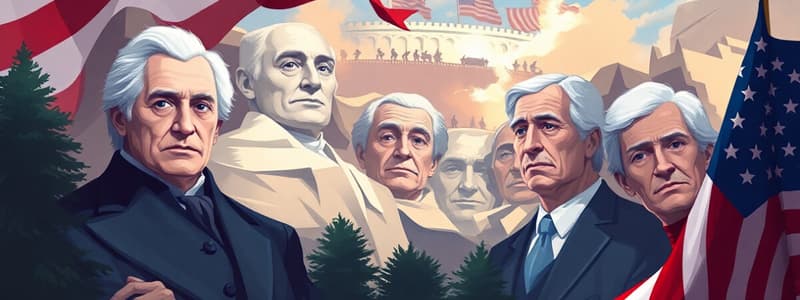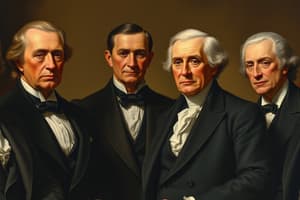Podcast
Questions and Answers
Which U.S. president was in office during the Cuban Missile Crisis?
Which U.S. president was in office during the Cuban Missile Crisis?
- Lyndon B. Johnson
- John F. Kennedy (correct)
- Richard Nixon
- Dwight D. Eisenhower
Which president initiated the New Deal in response to the Great Depression?
Which president initiated the New Deal in response to the Great Depression?
- Harry S. Truman
- Calvin Coolidge
- Franklin D. Roosevelt (correct)
- Herbert Hoover
Which U.S. president issued the Emancipation Proclamation?
Which U.S. president issued the Emancipation Proclamation?
- Ulysses S. Grant
- Andrew Johnson
- Abraham Lincoln (correct)
- Thomas Jefferson
Who was the president during the signing of the Treaty of Versailles, concluding World War I?
Who was the president during the signing of the Treaty of Versailles, concluding World War I?
Which president is associated with the Watergate scandal leading to his resignation?
Which president is associated with the Watergate scandal leading to his resignation?
Flashcards
US President
US President
The leader of the executive branch of the United States government.
Critical moments
Critical moments
Significant events in a president's term that had a major impact.
US Presidential terms
US Presidential terms
The period of time a president serves in office.
George Washington
George Washington
Signup and view all the flashcards
Abraham Lincoln
Abraham Lincoln
Signup and view all the flashcards
Study Notes
George Washington (1789-1797)
- Faced challenges establishing a new government and navigating international relations, setting precedents for future presidents.
- Presided over the ratification of the Constitution and establishment of the nation's initial governmental institutions.
- Avoided political factions, urging neutrality in international conflicts.
- His farewell address warned against the dangers of political parties and foreign entanglements.
- Significant moment: Established the precedents for future presidents' actions.
Thomas Jefferson (1801-1809)
- Doubled the size of the United States through the Louisiana Purchase.
- Championed westward expansion and agricultural interests.
- Embarked on the Lewis and Clark Expedition, exploring the newly acquired territory.
- Significant moment: Acquisition of the Louisiana Territory transformed the nation's geography and resources.
James Monroe (1817-1825)
- Oversaw the Era of Good Feelings, a period of national unity following the War of 1812.
- Issued the Monroe Doctrine, asserting American influence in the Western Hemisphere.
- Significant moment: The Monroe Doctrine shaped US foreign policy for decades, establishing a principle of non-interference in the Americas by European powers.
Andrew Jackson (1829-1837)
- Championed the common man, expanding suffrage and implementing policies favorable to farmers and working-class citizens.
- Used presidential power to remove Native American tribes from their ancestral lands.
- Significant moment: His policies had a devastating impact on Native American communities.
- Significant moment: Marked a turning point in American politics, shifting power to a wider segment of white citizens.
Abraham Lincoln (1861-1865)
- Led the nation through the American Civil War, preserving the Union and abolishing slavery.
- Issued the Emancipation Proclamation, freeing enslaved people in Confederate territory.
- Delivered the Gettysburg Address, which redefined the nation's purpose in the face of war.
- Significant moment: Preserved the United States as a nation despite the significant conflict and moral issues.
Franklin D. Roosevelt (1933-1945)
- Guided the nation through the Great Depression and World War II.
- Implemented the New Deal, a series of programs aimed at addressing the economic crisis.
- Led the Allied forces in defeating Nazi Germany and Imperial Japan.
- Significant moment: Oversaw the nation's transition to a global superpower.
- Significant moment: His New Deal programs had a lasting impact on government's role in the economy.
John F. Kennedy (1961-1963)
- Oversaw the early stages of the Cold War and the Civil Rights Movement.
- Initiated the space race, sending Americans to the moon.
- Inspired a generation with calls for national service and public interest.
- Significant moment: The Cuban Missile Crisis, a confrontation with the Soviet Union, and his assassination.
Lyndon B. Johnson (1963-1969)
- Passed landmark civil rights legislation, outlawing discrimination based on race, color, religion, sex, or national origin.
- Expanded the scope of presidential power, significantly increasing government spending on social programs.
- Significant moment: Increased political and social polarization due to the Vietnam War.
Richard Nixon (1969-1974)
- Opened relations with China, a major step in thawing Cold War tensions.
- Created the Environmental Protection Agency (EPA), and initiated the first Earth Day.
- Significant moment: Resigned from office in the face of impeachment proceedings for the Watergate scandal.
- Significant moment: Marked a point of significant political and governmental scandals.
Barack Obama (2009-2017)
- Overcame a significant economic recession and enacted health care reform, expanding access to insurance coverage.
- Ended the Iraq War and authorized the raid that killed Osama bin Laden.
- Increased use of drone strikes and advanced surveillance programs.
- Significant moment: His election as the first African American president marked a monumental milestone in American politics.
Donald Trump (2017-2021)
- Implemented significant tax cuts and deregulation measures, focused on economic growth.
- Appointed numerous conservative judges to federal courts.
- Significant moment: Increased political division and polarization across the country.
- Significant moment: The handling of the initial stages of the COVID-19 pandemic and his response to the insurrection at the US Capitol.
Studying That Suits You
Use AI to generate personalized quizzes and flashcards to suit your learning preferences.




